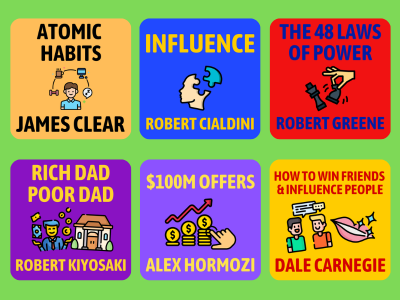Most of us have felt unmotived sometimes. No matter how much we tried, we just couldn’t get to work. Instead, we fell into procrastination, distraction, and eventually shame.
But what if we could fix our motivation simply by setting goals 10 times bigger than normal? Grant Cardone says society brainwashes us into aiming too low in the name of “balance.” But if we can learn to dream bigger again, then our audacious goals will inspire us to take massive action.
Who is Grant Cardone?
Grant Cardone (author site) is a popular social media personality, New York Times bestselling author and public speaker. He’s built successful companies in real estate and sales training. His social media pages millions of followers. His net worth is about $300 million, according to FreshWorks.
In this summary of The 10X Rule, we’ll explore some of the best lessons for business, productivity and success from Grant Cardone. Let’s see if they really work and how we can apply them to our lives.
🎯 1. Set 10X Goals: Aim for objectives 10 times larger than before; goals that feel significantly beyond your current reach
Grant Cardone writes down his goals every single day. He says this may be the biggest reason he became rich. In fact, his biggest regret in life is not setting much larger goals from the very beginning. That’s why he now teaches his students “The 10X Rule”:
This is the focus of the 10x Rule: You must set targets that are 10 times what you think you want and then do 10 times what you think it will take to accomplish those targets. Massive thoughts must be followed by massive actions.
In our society, we’re often taught to make our goals smaller and more achievable to avoid disappointment. We are told that it’s not good or somehow immoral to become very successful. So we learn to limit our desires to what is “realistic.” Cardone says this is a huge mistake because…
Realistic goals don’t excite anyone. It’s hard to stay motivated and work hard towards average goals. On the other hand, a large goal can be very inspiring, especially when it feels personally meaningful to us.
Bold, audacious goals get our heart pumping which helps us maintain enthusiasm for our projects over the long term. That’s why highly successful people often say work doesn’t feel like work. When Elon Musk is working 14 hours a day to send a rocket to Mars, you can bet he ain’t grumbling about the overtime like most employees.
In the classic success book Think and Grow Rich, the author Napoleon Hill interviewed over 500 millionaires including Henry Ford and Thomas Edison. He discovered that a common ingredient in all the successful people was a burning desire and obsessive focus.
Hill wrote, “Wishing will not bring riches. But desiring riches with a state of mind that becomes an obsession, then planning definite ways and means to acquire riches, and backing those plans with persistence which does not recognize failure, will bring riches.” Read more in our summary of Think and Grow Rich by Napoleon Hill.
The first part of the 10X Rule is choosing goals that are 10 times bigger than before. An audacious goal will excite and motivate us far more than a mediocre goal. Cardone recommends writing your goals out every single day.
🏃 2. Work 10X Harder: Multiply your efforts and dedication to stand out from others and make progress faster
The second part of the 10X Rule is backing your goals with massive action—ten times more action than you would usually do. Why? Because every worthwhile accomplishment always takes 10 times more effort than we originally expect. Even our most conservative estimates tend to be wildly inaccurate.
For example, Grant Cardone started his first business when he was 29 years old. He expected he would reach the income level of his previous job in 3 months. Unfortunately, that did’t happen. He was failing. He found himself beginning to make excuses for why he was failing like the economy, competition, market conditions, etc.
But suddenly he thought that maybe he had simply underestimated just how much hard work it takes to launch a new product.
So Cardone dropped the excuses and increased his actions by 10X. He went from making 3 sales calls per day to 30 calls per day. And his sales finally began to take off. In the end, it took him about 3 years to replace his previous income, about 10 times longer than he expected. Keep in mind this wasn’t 3 years of blind, repetitive, pig-headed effort. Along the way, he was constantly studying to upgrade his sales skills.
Cardone says all people fit into one of Four Degrees of Action:
- Do Nothing. People who don’t take action on their goals obviously fail. Yet they still do a lot of work inventing reasons and excuses for their lack of effort.
- Retreat. This means going backwards from our goals, often because of a fear of rejection or failure.
- Normal Action. Most people fit in here because it’s the most socially acceptable level. They do enough work to create an average existence, but no more.
- Massive Action. These people seek to dominate each goal with relentless, persistent action. Although we are often told working too much is wrong, look at kids. Kids are fully engaged to the point of obsession with anything they do. It’s time for us to reclaim that natural state.
Another great sales trainer is Brian Tracy. In his book The Psychology of Selling, he echoes Cardone’s message that massive action is the key. Brian wrote, “The fastest way to increase your income is simple. It is the key to success in selling. ‘Spend more time with better prospects.’ This six-word formula is the recipe for high income in every market.” Learn more in our summary of The Psychology of Selling by Brian Tracy.
The second part of the 10X Rule is backing up your large goals with massive action. Cardone says we wildly underestimate how much work any accomplishment is going to take. His first business became successful only after he increased his actions by 10X.
🌟 3. Expand When Others Contract: Seize opportunities to grow when others are hesitant, capitalizing on less competition
During recessions and recessions, most businesspeople instinctively contract. This means they are feeling uncertain so they want to be cautious, save money and cut expenses. However, Grant Cardone says this is the wrong move.
The most successful people see bad times as the best opportunity to expand. When all your competition is retreating, then you have a wide open road to your next level of success.
For example, during the 2009 financial crisis, many people lost money and felt afraid. Grant Cardone also felt uncertain because he owns a lot of real estate. Yet instead of retreating, he expanded his business on all fronts. As a result, he came out of the recession stronger than ever. For example:
- He published multiple books and sales programs.
- He did hundreds of articles and radio interviews.
- He made thousands of calls and told his staff to do the same.
The motivational speaker Tony Robbins wrote a short book on finance and investing called Unshakeable. Tony wrote about how the richest investors handled the 2009 financial crisis with confidence. At that time, most people felt very scared which made them want to sell their investments and get out of the market. Their fear was amplified by the news which is often designed to excite emotions rather than inform us.
Yet during the same time, highly successful investors like Warren Buffet were looking to buy. During that 2009 crisis Buffet said, “A simple rule dictates my buying: be fearful when others are greedy, and be greedy when others are fearful. And most certainly, fear is now widespread.” Buffet was buying tons of companies and stocks. Some observers said he was crazy, but years later now everyone says he made a ton of money through buying stocks when they were underpriced. Learn more investing lessons in our summary of Unshakeable by Tony Robbins.
Hard times like market downturns and recessions cause most people to contract. This is the best time for you to expand by doubling down on your efforts. As Buffet says, “Be greedy when others are fearful.”
🔝 4. Always Keep Pursuing Success: Continuously strive for achievement, never settling for current accomplishments
Unsuccessful people imagine they could get rich and stop working forever. By contrast, all the successful people Grant Cardone knows are continuously looking forward to their next target. He says being successful is like tending a garden, there is no point at which you can stop and have it continue to stay beautiful forever.
Ray Kroc, the founder of McDonald’s, wrote a very similar lesson: “Business is not like painting a picture. You can’t put a final brush stroke on it and then hang it on the wall and admire it. We have a slogan posted on the walls around McDonald’s headquarters that says, ‘Nothing recedes like success. Don’t let it happen to us or you.'” Learn the story behind McDonald’s extraordinary success in our summary of Grinding it Out by Ray Kroc.
Here are 3 more essential lessons about success from Cardone:
- Success is your duty. By creating wealth, you are contributing to your family, community, country and the world. If you don’t work hard then you will likely become a drain on those around you, from your relatives to society.
- Success evolves as you get older. As we age, our goals and priorities naturally change. If you get married and become a parent, then you will gain some entirely new ideals to aim for.
- Massive success ensures your security. Taking 10X action is important because extra success provides a cushion of safety that will support you during times of distress, illness, depressions, downturns, etc.
Part of being successful is always looking forwards to the next target, rather than slipping back into complacency. Remember that success is your duty to those around you and that massive 10X action ensures your future security.
📈 5. Obsess About Results, Not Effort: Focus on achieving tangible outcomes rather than just how long or hard you work
Most people are constantly thinking about how much effort they have spent, how many hours they have worked and whether they deserve overtime pay. Many of us were raised in schools that taught us we should feel good just for trying. (I remember all the kids getting participation ribbons even if they came in last place.) However, this approach totally fails in the business world.
Highly successful people focus entirely on results and outcomes. When you’re growing a business, how much effort or time you put in is irrelevant. It doesn’t matter if you spent one hour or all day making phone calls, what matters is how many sales you closed. Cardone says we must “be hard on ourselves” and obsess about achieving outcomes rather than simply feeling good for trying.
A focus on outcome helps us enjoy work. You see, all the rewards from work go those people who persist “all the way” until they achieve the outcome. Working and working without a result simply tires us out and makes us lose motivation.
Most people make only enough effort for it to feel like work, whereas the most successful follow up every action with an obsession to see it through to a reward.
Society teaches us to pat ourselves on the back just for trying. But highly successful people are obsessed with getting results and achieving outcomes. This makes work rewarding and enjoyable, rather than an endless chore.
🌱 6. View Problems as Opportunities: Transform your obstacles and challenges as stepping stones for growth
Unsuccessful people shy away from problems and challenges. They consider them another headache or potential failure.
On the other hand, successful people know that solving problems leads to more success. Cardone says becoming successful means creating more problems for yourself, which means you must never be afraid of new challenges. For example, after you solve the problem of getting clients, then you will have the new problem of delivering a high quality service to those clients.
The millionaire entrepreneur MJ DeMarco gives some great advice for starting a new business: “Stop thinking about business in terms of your selfish desires, whether it’s money, dreams or ‘do what you love.’ Instead, chase needs, problems, pain points, service deficiencies, and emotions.”
One great way of looking at business is that every profitable product or service is simply a solution to someone else’s problem. If you can make life easier, faster or more convenient for others, then you’re probably on the path to prosperity. Learn more great business advice like this in our summary of his book The Millionaire Fastlane by MJ DeMarco.
Another type of problem you’ll encounter are customer complaints. At their best, complaints can show you new opportunities for improving your product or service. You can find out exactly how to serve people’s needs better than the competition.
However, general criticism can also come as a natural side effect of success. When you command a lot more attention, some of it will inevitably be negative. For example, even the most inoffensive and wholesome Youtube videos have some dislikes from perpetually dissatisfied people. So Grant Cardone says it’s best not to take most criticism personally.
Opportunity often comes disguised as new problems. If you can solve bigger problems for more people, then you’ll become very successful. Customer complaints can teach us how to improve our product and beat the competition.
Conclusion
I hope you’re feeling fired up right now to dominate your goals! This book provides a window into the mind of a highly successful author and investor. It reads like a 10-hour pep talk from a football coach. I think some people may be turned off by this kind of writing, but for others it may be just the right message at the right time.
My favourite part was the idea of resetting our expectations. Starting a new business or building a successful career will probably take 10 times more work than we expect… so we better get prepared to persevere!



























Community Notes